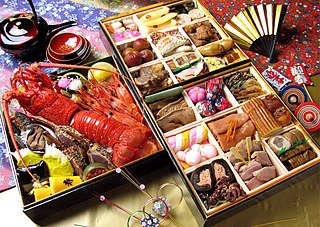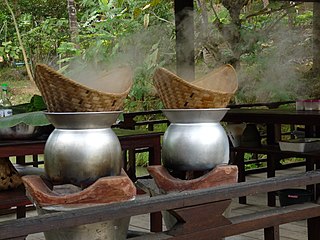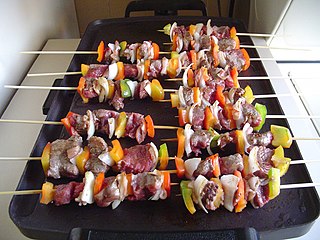
American Chinese cuisine is a cuisine derived from Chinese cuisine that was developed by Chinese Americans. The dishes served in many North American Chinese restaurants are adapted to American tastes and often differ significantly from those found in China.

Japanese cuisine encompasses the regional and traditional foods of Japan, which have developed through centuries of political, economic, and social changes. The traditional cuisine of Japan is based on rice with miso soup and other dishes with an emphasis on seasonal ingredients. Side dishes often consist of fish, pickled vegetables, and vegetables cooked in broth. Common seafood is often grilled, but it is also sometimes served raw as sashimi or as sushi. Seafood and vegetables are also deep-fried in a light batter, as tempura. Apart from rice, a staple includes noodles, such as soba and udon. Japan also has many simmered dishes, such as fish products in broth called oden, or beef in sukiyaki and nikujaga.

Steaming is a method of cooking using steam. This is often done with a food steamer, a kitchen appliance made specifically to cook food with steam, but food can also be steamed in a wok. In the American Southwest, steam pits used for cooking have been found dating back about 5,000 years. Steaming is considered a healthy cooking technique that can be used for many kinds of foods.

Fried rice is a dish of cooked rice that has been stir-fried in a wok or a frying pan and is usually mixed with other ingredients such as eggs, vegetables, seafood, or meat. It is often eaten by itself or as an accompaniment to another dish. Fried rice is a popular component of East Asian, Southeast Asian and certain South Asian cuisines, as well as a staple national dish of Indonesia. As a homemade dish, fried rice is typically made with ingredients left over from other dishes, leading to countless variations. Fried rice first developed during the Sui dynasty in China.

Champon, also known as Chanpon, is a noodle dish that is a regional cuisine of Nagasaki, Japan. There are different versions in Japan, Korea and China. The dish was inspired by Chinese cuisine.

Hong Kong cuisine is mainly influenced by Cantonese cuisine, European cuisines and non-Cantonese Chinese cuisines, as well as Japanese, Korean and Southeast Asian cuisines, due to Hong Kong's past as a British colony and a long history of being an international port of commerce. Complex combinations and international gourmet expertise have given Hong Kong the labels of "Gourmet Paradise" and "World's Fair of Food".

Singaporean cuisine is derived from several ethnic groups in Singapore and has developed through centuries of political, economic, and social changes in the cosmopolitan city-state.

Filipino cuisine is composed of the cuisines of more than a hundred distinct ethnolinguistic groups found throughout the Philippine archipelago. A majority of mainstream Filipino dishes that compose Filipino cuisine are from the food traditions of various ethnolinguistic groups and tribes of the archipelago, including the Ilocano, Pangasinan, Kapampangan, Tagalog, Bicolano, Visayan, Chavacano, and Maranao ethnolinguistic groups. The dishes associated with these groups evolved over the centuries from a largely indigenous base shared with maritime Southeast Asia with varied influences from Chinese, Spanish, and American cuisines, in line with the major waves of influence that had enriched the cultures of the archipelago, and adapted using indigenous ingredients to meet local preferences.

Fish balls are the balls made from fish paste which are then boiled or deep-fried. Similar in composition to fishcake, fish balls are often made from fish mince or surimi, salt, and a culinary binder such as tapioca flour, corn, or potato starch.

Ghanaian cuisine refers to the meals of the Ghanaian people. The main dishes of Ghana are centered around starchy staple foods, accompanied by either a sauce or soup as well as a source of protein. The primary ingredients for the vast majority of soups and stews are tomatoes, hot peppers, and onions. As a result of these main ingredients, most Ghanaian jollof rice, soups, and stews appear red or orange.

Honduran cuisine is a fusion of Mesoamerican, Spanish, Caribbean and African cuisines. There are also dishes from the Garifuna people. Coconut and coconut milk are featured in both sweet and savory dishes. Regional specialties include sopa de caracol, fried fish, tamales, carne asada and baleadas. Other popular dishes include meat roasted with chismol and carne asada, chicken with rice and corn, and fried fish with pickled onions and jalapeños. In the coastal areas and the Bay Islands, seafood and some meats are prepared in many ways, including with coconut milk. Among the soups the Hondurans enjoy are bean soup, mondongo soup, seafood soups and beef soups. Generally all of these soups are mixed with plantains, yuca, and cabbage, and served with corn tortillas.

Chinese regional cuisines are amongst the many different cuisines found in different provinces and prefectures of China as well as from larger overseas Chinese communities.

Hot and sour soup is a popular example of Chinese cuisine. Although it is said to be originated in Sichuan, this is actually a variant of hulatang or "pepper hot soup" (胡辣汤) with added vinegar to enhance the sourness. This variation is found in Henan province, and in Henan cuisine itself. Also popular in Southeast Asia, India, Pakistan and the United States, it is a flexible soup which allows ingredients to be substituted or added depending on availability. For example, the American-Chinese version can be thicker as it commonly includes corn starch, whilst in Japan, sake is often added.

A wonton is a type of Chinese dumpling commonly found across regional styles of Chinese cuisine. It is also spelled wantan or wuntun in transliteration from Cantonese 雲吞 / 云吞 and wenden from Shanghainese 餛飩 / 馄饨. Even though there are many different styles of wonton served throughout China, Cantonese wontons are the most popular in the West due to the predominance of Cantonese restaurants overseas.














